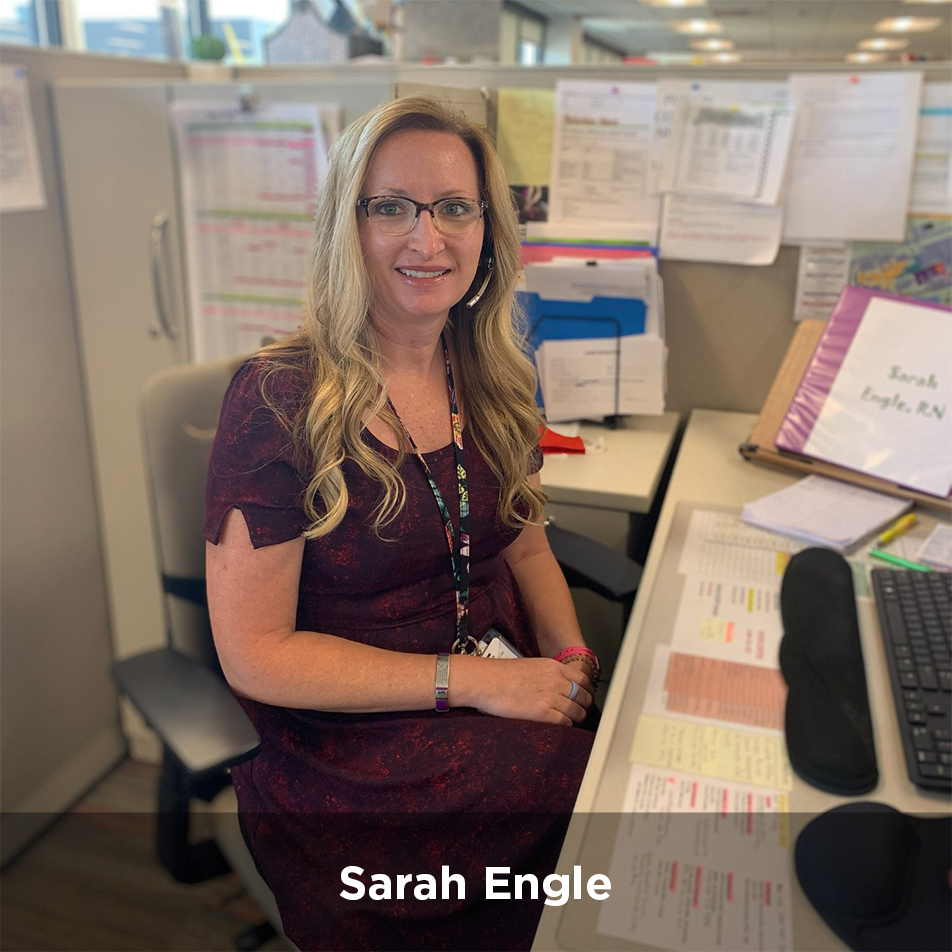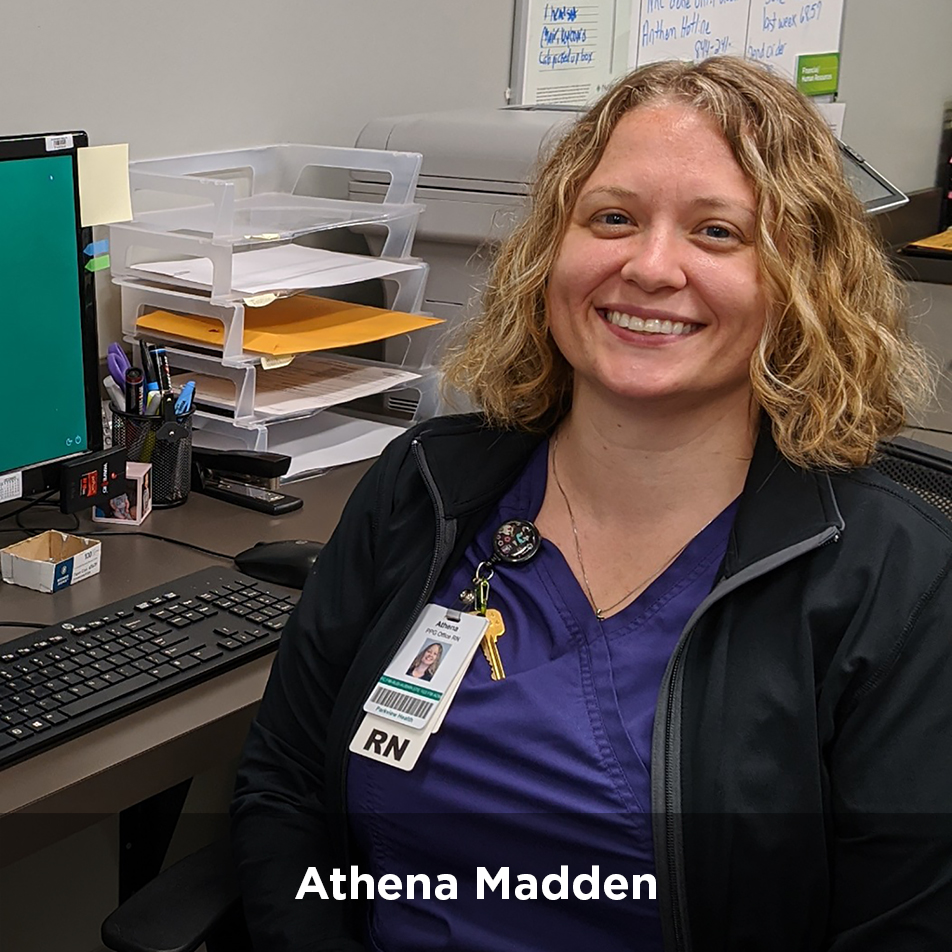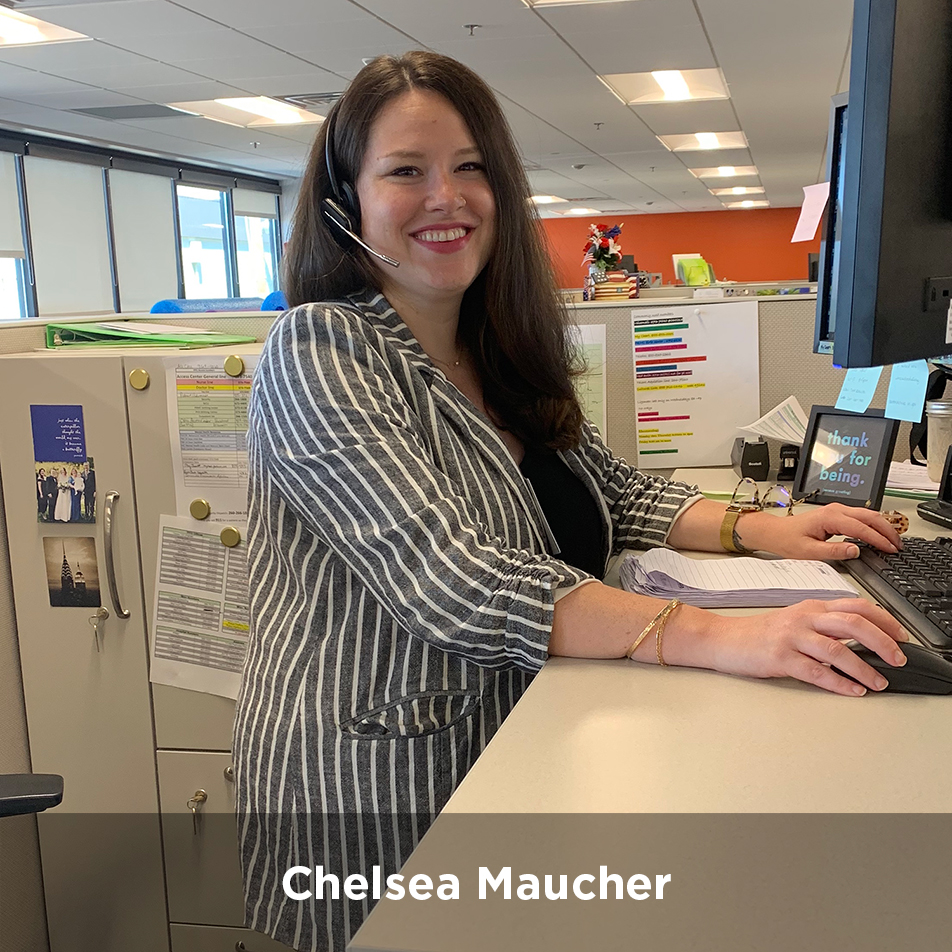
As the coronavirus pandemic brought many traditional services to a halt in early March, Parkview nurses began answering phones to address the public’s health concerns and connect them with the appropriate, available resources, primarily through the Parkview Access Center. We interviewed three of these team members, Chelsea Maucher, MSN, RN, AGACNP-BC, CCRN, Sarah Engle, RN, and Athena Madden RN, PPG office nurse, to learn more about what their roles have been like for the past several months.
How long have you been with Parkview?
Chelsea: 3 months
Sarah: 1 year, 8 months
Athena: 3 years
What attracted you to this role?
Chelsea: I moved back to Fort Wayne from New York City in early March and interviewed for my position in mid-March. At the time of my interview, news of the pandemic was growing, and the call volume had already increased significantly. I was excited for a new challenge and the role seemed very flexible.
Sarah: I had been a MedSurg/ICU nurse for 13 years and was in need of a change. Phone nursing allowed be to still be a nurse, utilize my critical thinking skills daily and help patients in need, but in a much different way. I also love that this nursing position is a lot less stressful than being an inpatient nurse.
Athena: I worked surgery and inpatient prior to transitioning to office work. I like the day shift hours, and that I don’t work weekends, holidays or call.

How did things in your role change in March?
Sarah: Our call volume tripled or quadrupled within 2-3 weeks. It was difficult for a few weeks, primarily because symptoms and recommendations were changing or being added regularly. The phone nurses did a lot of COVID-19 symptom triaging, for PPG and non-PPG patients. We even had phone calls from people living in Florida and Texas because they found our number online. It was very interesting, but also challenging.
We were so busy, and we still had our non-COVID calls for triaging other symptoms, giving test results and refilling medications for patients. It was kind of exciting being able to help people, answer their questions and calm their anxiety during a crisis. Of course, during this time, we were still orienting new nurses to the department. We also trained quite a few nurses from some of the PPG offices so they could start working as phone nurses and triaging patients’ symptoms as well. Many of our providers started doing telemedicine visits, so that was a learning curve for everyone. And with all of the telemedicine visits that were being scheduled, a majority of these patients needed to activate their MyChart accounts so the nurses and the Access Center schedulers also helped patients with that process.
In what special ways did you help patients during this time?
Chelsea: Many people were anxious, and others seemed to be in a state of disbelief that this was happening to their loved ones and our community. Patients had a lot of questions regarding testing, risk of exposure, ways to prevent infection and symptoms. Many people called in requesting an increased dosage of their antidepressants or to be started on anti-anxiety medications for new onset of stressors surrounding the state of affairs. Everyone I spoke with on the phone was somehow affected by the pandemic. I hope I helped in some small way by listening to them and being a calm, concerned voice in a time of widespread fear and isolation.
Sarah: People were, and still are, quite anxious. Many people were very understanding with how fast things were changing for us and the way we had to direct their calls or had to reschedule appointments. Almost all patients who state they feel anxious or depressed get transferred to a nurse. All we can do is try to calm their fears the best that we can and let them know that they are not alone in their concerns. So many people have the same thoughts or fears, but not a lot talk about them. We gave acknowledgement and a lot of reassurance that we would all get through this difficult time together. Trying to stay positive and talking in a calm manner to patients on the phone is very important.
Athena: A lot of patients were upset that they couldn’t physically see their doctors, and we understood. I would explain the situation and what our options were to keep both the patient and staff safe. Most of the time people were understanding and would make either a virtual appointment/telephone appointment or, if necessary, seek treatment at the Respiratory Clinic/walk-in clinic.

Your roles became incredibly important to the health system during this time. Did you feel that shift in demand?
Chelsea: My time at the Access Center has been nonstop since day one, with phone calls from concerned patients, most regarding the COVID-19 pandemic. The Access Center became this essential source of knowledge for our greater community because patients were scared and wanted advice from a trusted entity. The job has been incredibly busy, and I definitely admit to feeling overwhelmed myself sometimes by both the volume and emotional intensity of the calls we received from sick, scared and anxious patients.
Sarah: I definitely felt the shift in responsibility and our roles did change somewhat. We became the “pre-frontline” nurses, if you will. We screen a lot of patients for COVID symptoms to determine if they need to go to an Emergency Department. We had so many more calls from very concerned citizens. Of course, we as nurses were also concerned, but many of us were grateful to be working as phone nurses. We helped so many people by educating them on the signs and symptoms of COVID-19 and how they could protect themselves and their families at home. Personally, I felt some guilt about no longer being an inpatient nurse with direct contact with the patients. I loved being a floor nurse. That’s one thing I miss about not working MedSurg and ICU. I know I have the knowledge, skillset and experience to take care of very sick people. I just had to remind myself that I’m still helping people by easing their fears. I’m just doing it by talking to them on the phone.
Athena: I did feel that shift. I usually have quite a few phone calls a day but there was definitely an influx in the first few weeks of us closing to our normal patients (my office became the walk-in clinic for DeKalb County) before going to the Access Center. Once at the Access Center, I did have more responsibility because it wasn't just my providers I was taking care of anymore. It was all PPG providers. I found my flow and met some amazing people and it was a really great learning experience for me.
What are some of the unique challenges to your role?
Chelsea: Triaging patients’ symptoms and issues with just words is truly a skill. I have always relied heavily on all of my senses during an assessment, so only using my ears and my language abilities to triage and advocate for my patients has been an acquired expertise.
Sarah: In a lot of ways, we have to have even better assessment skills because we don’t have that first visual contact with a patient that can tell a nurse so much about what could be going on. We have to know what questions to ask people to get the most accurate information to help us in our assessment. Sometimes I will ask a patient basically the same question, but in three different ways, just to make sure I’m getting consistent information. One challenge that I have daily is that the nurses at the Access Center answer patient calls for over 50 primary care provider offices. We definitely have to be investigators and be knowledgeable about all of the places to look in a patient’s chart for things, which can be challenging.
What do you find rewarding about your role?
Chelsea: I love that there are so many different facets to this job, and no two days are ever the same. We truly try to go out of our way to help the patients at the Access Center, and sometimes that involves calling every doctor, lab tech and pharmacist on the interdisciplinary team. I enjoy the dynamic workflow and collaboration.
Athena: Learning new techniques and the people that I met and worked with at the Access Center. Also, there were a few patients who really made the experience great. Most patients were very grateful just to have someone to talk to and help them get in contact with their provider’s office.
Sarah: Honestly, everything. I love being a nurse and I knew, from a young age, that I would be an RN one day. I love knowing I can help people in their time of need. A friend of mine, also an NP, shared this phrase with a group of my nurse friends: “Perhaps this is the moment for which you were created.” This was shared at the beginning of March when the first positive cases of COVID-19 were appearing in Northeast Indiana, and we were all very unsure of what was going to happen and how our jobs would change. It really resonated with me and I believe a lot of nurses have felt this way during this pandemic. This is why I became a nurse. I just didn’t know it at the time.